 CROP.jpg?itok=_jA8sfIl)

Wilderness Area Maps
Nova Scotia Wilderness Area Water Trails Google Map shows all of the areas mapped by Tristan Glen as well as areas plotted by CKNS members.
Wilderness Areas are administered by Nova Scotia Environment. For more information visit: www.novascotia.ca/nse/protectedareas or call 902-424-3600. These maps were produced by Tristan Glen, 2019. For information regarding these maps, contact Tristan via email at: [email protected]
- Waverley Wilderness Area Water Trail Waverley - Salmon river. Long lake wilderness area canoe routes. Halifax regional municipality, Nova Scotia.
- Medway Wilderness Area Water Trail Medway lakes wilderness area canoe routes. Annapolis county, Sova Scotia.
- Ship Harbour Long Lake Wilderness Area Skull lake loop managed water trail. Ship harbour long lake wilderness area. Canoeing, angling, camping, snowshoeing and other adventure.
- Melopseketch Lakes and Liscomb River - ** IMPORTANT WARNING: ALMOST ALL PORTAGES IN THE AREA ARE IMPASSABLE DUE TO HURRICANE FIONA DAMAGE. THERE ARE MAJOR WASHOUTS ON SOME OF THE LOGGING ROADS. ONLY THE PORTAGE FROM LISCOMB RIVER ROAD TO MELOPSEKETCH LAKE HAS BEEN REOPENED, AS OF JUNE 17, 2023. RECENT VISITORS TO THE AREA ARE ASKED TO KINDLY SEND UPDATES TO [email protected]. ** (Boggy Lake + Liscomb River Wilderness Areas). Preliminary water trail map for canoeing, angling, camping, snowshoeing and other adventures.
- Cloud Lake Loop (Cloud Lake Wilderness Area). Water trail map for canoeing, angling, camping, snowshoeing and other adventures.
- Whale Cove Loop (Terence Bay Wilderness Area). Preliminary water trail map for canoeing, kayaking, angling, camping and other adventures.
Also included in this map are areas plotted by CKNS members:
Birch Cove Lakes, HRM.


Paddling Sites in Nova Scotia
Coastal Water Trail Launch Sites
Public launch sites suitable for paddlers, part of the Nova Scotia Coastal Water Trail. This CKNS project helps both resident and visiting paddlers access the coast and plan day trips or longer tours. Each launch site description provides directions by land and sea, GPS coordinates, photos and on-site amenities. Local services such as places get groceries are listed which helps local businesses. Possible paddling tours in nearby waterways are suggested.
Inland Paddling Routes and Launch Sites on Google Maps
Download our CKNS Paddling Maps made in partnership with Service Nova Scotia and Municipal Relations Office of Health Promotion - Sport and Recreation Division. Although these maps were produced in 2005, they still have valuable information for these historical paddling routes. This section also includes many launch sites located around the province and the historic Shubenacadie Canal waterway.
Paddle Routes Lunenburg/Queens counties
Annapolis County Paddling Routes



Whitewater Paddling
Some of Nova Scotia’s rivers offer good whitewater paddling opportunities. There is a small but enthusiastic whitewater kayaking fraternity that paddle regularly throughout the year. We also have some very good Atlantic coastal surf for those who enjoy the sport of kayak surfing.
Here is a link to a website created by one of CKNS' member instructors/volunteers with data on some NS Whitewater Rivers - https://levels.whitewaterns.ca/
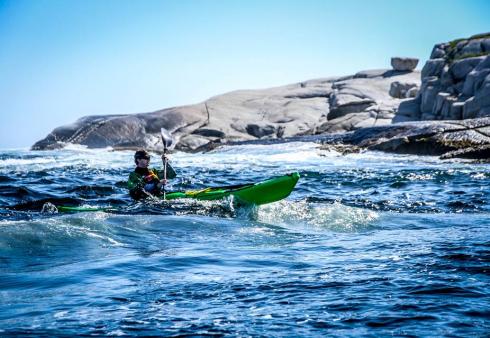
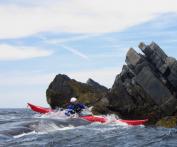
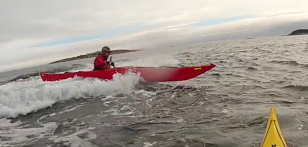
Kayak Surfing
Nova Scotia’s coastline faces the open Atlantic, providing some of the best surfing opportunities along the eastern seaboard. Whitewater and sea kayakers have been taking advantage of these breaks all year round. Stoney Beach at Lawrencetown outside Dartmouth provides good access to the point break here. Other locations include Martinique Beach, Cherry Hill Beach and Clam Harbour Beach. To be safe, you should have a good roll and always wear warm clothing and a helmet. Never surf alone and remember to practice good surfing etiquette and wait your turn.
Here are some useful resources for Kayak Surfing in Nova Scotia:
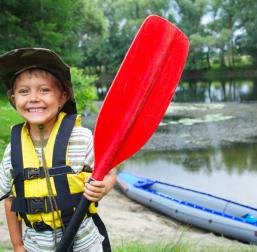
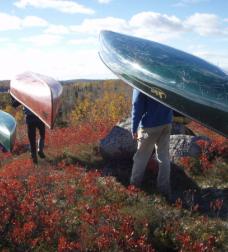


A Paddler's Paradise
The fishing and hunting tradition in Nova Scotia has created a web of portages and trails. Look at Inland routes for some suggestions. You will find links to inland paddling route maps produced by the province, as well as other on line resources to help you plan your trip.
Safe Boating
CKNS promotes safe boating through a combination of skills training, proper preparation and equipment. We strongly support the proper use of personal floatation devices (PFDs). These should be worn whenever a paddler gets into a boat.
Nova Scotia allows camping on crown land and in designated wilderness areas without cost; however, much of Nova Scotia is privately owned. Please ask permission before crossing or camping on private land. Please practice No Trace Camping.
